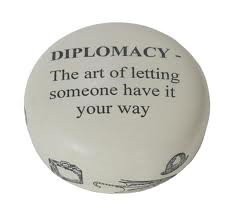The new semester begins in less than two months and I’m pumped! I’m particularly anxious to be back in the classroom again because I’m coming off a year’s sabbatical and have not been in front of a class for fifteen months. In addition, this will be the first time in over ten years that I have not had to balance my teaching energies with significant administrative duties. I’ve already been asked to chair one committee and be a member of two others this coming year, but that’s nothing compared to running a department or program. I’m not complaining, though–I learned a lot about myself and my leadership style over the past decade. I wrote about this a couple of years ago as I entered my final year of running a large interdisciplinary program on my campus . . .
 Over five hundred years ago, Niccolò Machiavelli raised a classic question in The Prince: for a person with power seeking to keep or increase that power, Is it better to be loved or to be feared? This question came up in two separate seminars during Old Testament week with my freshmen in only their second week of college. The texts for the day were the first twenty-five chapters of Genesis along with the first twenty-five of Exodus; the main character in these texts—God—seems in his omniscience to have decided Machiavelli’s question millennia before Machiavelli ever showed up. For an extraordinarily powerful being who also happens to be capricious, vengeful, manipulative, insecure and self-absorbed, fear is far more effective than love. My students frequently wondered why God so often found it necessary to express divine power in over-the-top and destructive ways, given that nobody doubted who was more powerful in a God-human comparison, nor was it likely that anyone was plotting an overthrow of God’s rule.
Over five hundred years ago, Niccolò Machiavelli raised a classic question in The Prince: for a person with power seeking to keep or increase that power, Is it better to be loved or to be feared? This question came up in two separate seminars during Old Testament week with my freshmen in only their second week of college. The texts for the day were the first twenty-five chapters of Genesis along with the first twenty-five of Exodus; the main character in these texts—God—seems in his omniscience to have decided Machiavelli’s question millennia before Machiavelli ever showed up. For an extraordinarily powerful being who also happens to be capricious, vengeful, manipulative, insecure and self-absorbed, fear is far more effective than love. My students frequently wondered why God so often found it necessary to express divine power in over-the-top and destructive ways, given that nobody doubted who was more powerful in a God-human comparison, nor was it likely that anyone was plotting an overthrow of God’s rule.  The ancient Israelites and their forebears had probably read Milton’s Paradise Lost and found out what happened to Lucifer when he tried that. And apparently God wasn’t aware that Machiavelli’s question applies only to those whose power can actually be lost. If one is omnipotent, one can do whatever the hell one wants.
The ancient Israelites and their forebears had probably read Milton’s Paradise Lost and found out what happened to Lucifer when he tried that. And apparently God wasn’t aware that Machiavelli’s question applies only to those whose power can actually be lost. If one is omnipotent, one can do whatever the hell one wants.
But for mere mortals lacking the ability to generate world-wide floods or to drop creative plagues on non-compliant people, Machiavelli’s question remains pressing. If one finds oneself in a position of power or authority and is seeking to use that power effectively, is it better to cultivate love or fear among those under one’s authority? Although teachers sometimes sound as if they are entirely powerless in the face of pressures from all constituencies, in fact a teacher in the classroom finds herself in a situation of almost complete power that demands a constant, flexible, lived answer to Machiavelli’s question. A teacher’s success or failure depends on how she or he shapes love and fear into a structure solid enough to withstand challenge but flexible enough to address the ever-changing atmosphere of the classroom on a daily basis.  I’ve been at it for over twenty-five years and am still working on it.
I’ve been at it for over twenty-five years and am still working on it.
I had to think through the “love or fear” issue in an entirely different manner when I found myself in an academic administrative position for the first time. As the chair of the twenty-two-member philosophy department, knowing that if trying to lead faculty is like herding cats, then trying to lead philosophers is like herding a breed of cats who believe that ideas alone are enough and that simply thinking something makes it so, I worried about how to even begin. At the end of four sometimes exhausting years, I was surprised to look back on my term as chair and conclude that it had largely been a success. We rewrote the department mission statement, entirely revised our major and minor, and hired six tenure-track faculty, all without anyone getting killed or maimed. Not known for my “people skills,” it turned out that I had a knack for what might be called “diplomatic persuasion.” I sometimes described this new-found skill as the ability to “diss someone without their knowing they’ve been dissed until a day later,” or to “convince people that what you want them to do is actually their idea.”  Amid tedious solitary hours of paperwork and tedium, the people management thing was sort of fun—and no one hated me (that I’m aware of) at the end of four years.
Amid tedious solitary hours of paperwork and tedium, the people management thing was sort of fun—and no one hated me (that I’m aware of) at the end of four years.
When I was asked a couple of years later to step into much larger and more challenging administrative role—leading the large interdisciplinary program that is the centerpiece of my college’s core curriculum—I dusted off my “diplomatic persuasion” skills and retooled them for the task of leading and cajoling four times as many faculty down a much more treacherous path than I traveled with the philosophy department in my years as chair. Within the first couple of my first semester as director, I established a few new policies and started some difficult collective conversations that I fully expected to generate significant pushback. Surprisingly, I received almost none—everyone actually started doing what I asked. “Wow!” I thought. “My ‘diplomatic persuasion’ leadership skills really work! I actually know what I’m doing!”
Early one morning shortly before the day’s classes began I mentioned to a colleague who was a teaching veteran in the program my pleasant surprise that no one had (yet) directly complained about the new directions the program was turning toward. “That’s because everyone’s afraid of you,” my colleague suggested. Afraid of ME? Really? Introverted little ole me??  Although my colleague is not known for her sense of humor, I assumed she was kidding. “Yeah, right (ha ha ha)” I said. She replied by revealing something about me that I never knew “No, really. You can be very intimidating at times.” Add fifteen years in the program, tenure, full professorship, introversion, a teaching award and a gray ponytail together and apparently the illusion of intimidation is produced. “Fine,” I thought. “If people are under the false impression that I’m scary on some level and it’s causing them to actually pull together in a good direction, then that’s a card worth playing as long as it works.” When I reported a couple of weeks later to my two sons at our annual Thanksgiving gathering that the faculty in my program is afraid of me, the news produced guffaws and laughter of a rolling-on-the-ground-and-gasping-for-air variety.
Although my colleague is not known for her sense of humor, I assumed she was kidding. “Yeah, right (ha ha ha)” I said. She replied by revealing something about me that I never knew “No, really. You can be very intimidating at times.” Add fifteen years in the program, tenure, full professorship, introversion, a teaching award and a gray ponytail together and apparently the illusion of intimidation is produced. “Fine,” I thought. “If people are under the false impression that I’m scary on some level and it’s causing them to actually pull together in a good direction, then that’s a card worth playing as long as it works.” When I reported a couple of weeks later to my two sons at our annual Thanksgiving gathering that the faculty in my program is afraid of me, the news produced guffaws and laughter of a rolling-on-the-ground-and-gasping-for-air variety.
I was reminded of all of this three years later just the other day as the latest Facebook personality quiz caught my attention. “Which Shakespeare character are you?” Fully expecting the typical bland “You are Hamlet” or “You are Prospero,” another unknown feature of myself was unexpectedly revealed.
http://quizsocial.com/which-shakespeare-character-are-you/
 You got: Lady Macbeth! Wow, are you ever good at manipulating people into doing what you want! It is a valuable skill, one that could help you secure a job in government one day, but also a dangerous one. Like Lady Macbeth, you have a love of power that could motivate you to do evil things. Don’t let it overtake you.
You got: Lady Macbeth! Wow, are you ever good at manipulating people into doing what you want! It is a valuable skill, one that could help you secure a job in government one day, but also a dangerous one. Like Lady Macbeth, you have a love of power that could motivate you to do evil things. Don’t let it overtake you.
Well now—that’s very interesting. Am I really channeling one of the most determined and evil manipulators in all of Western literature? The closest contemporary comparison to Lady Macbeth is Claire Underwood, the amoral, calculating, ambitious and uncompromisingly cold wife of Frank Underwood,  the Senate majority whip who in two seasons has climbed, manipulated, lied and murdered his way to the Presidency in Netfix’s megahit “House of Cards.” The only person more ruthlessly calculating than Frank in the “House of Cards” universe is Claire—she keeps his manipulative batteries charged when they run low. And I’m not making this up—there’s a whole cottage industry on-line that documents just how indebted “House of Cards” is to Shakespeare, especially to “Richard III” and “Macbeth,” and just how much Claire and Frank’s marriage mirrors the relationship between Lady and King (for a short time) Macbeth. (Spoiler alert)
the Senate majority whip who in two seasons has climbed, manipulated, lied and murdered his way to the Presidency in Netfix’s megahit “House of Cards.” The only person more ruthlessly calculating than Frank in the “House of Cards” universe is Claire—she keeps his manipulative batteries charged when they run low. And I’m not making this up—there’s a whole cottage industry on-line that documents just how indebted “House of Cards” is to Shakespeare, especially to “Richard III” and “Macbeth,” and just how much Claire and Frank’s marriage mirrors the relationship between Lady and King (for a short time) Macbeth. (Spoiler alert)
http://www.huffingtonpost.com/2014/02/21/house-of-cards-shakespeare-_n_4823200.html
So apparently my commitment to “diplomatic persuasion” is actually an expression of my deep-seated commitment to power and manipulation.  My expressed desire to lead the program I direct effectively into a new and more creative future is a thinly disguised working out of my need to control. Nietzsche was right after all—all living things seek not just to survive but to extend their dominance and influence as far as possible. Administering an academic department or program has unexpectedly turned out to be an effective way for me to get to do what all human beings secretly want to do but often never get a chance to do—boss other people around and make them dance to your tune. I may end up dead with indelible blood on my hands, but the journey will be a lot of fun.
My expressed desire to lead the program I direct effectively into a new and more creative future is a thinly disguised working out of my need to control. Nietzsche was right after all—all living things seek not just to survive but to extend their dominance and influence as far as possible. Administering an academic department or program has unexpectedly turned out to be an effective way for me to get to do what all human beings secretly want to do but often never get a chance to do—boss other people around and make them dance to your tune. I may end up dead with indelible blood on my hands, but the journey will be a lot of fun.
Or not. I’m not buying this, because I’m not buying that leadership necessarily requires a commitment to manipulation and power.  But I might be wrong. Maybe my sabbatical project should be to establish a new Lady Macbeth School of Leadership on some campus somewhere. It’s a thought. P.S. From Facebook comments generated by the results of the above Shakespeare quiz, I have discovered that friends and colleagues have learned that they are Bottom, Iago, Falstaff or Richard III. But so far I’m the only Lady Macbeth. The “quizsocial” person must have been having a very dark day when he/she put this quiz together.
But I might be wrong. Maybe my sabbatical project should be to establish a new Lady Macbeth School of Leadership on some campus somewhere. It’s a thought. P.S. From Facebook comments generated by the results of the above Shakespeare quiz, I have discovered that friends and colleagues have learned that they are Bottom, Iago, Falstaff or Richard III. But so far I’m the only Lady Macbeth. The “quizsocial” person must have been having a very dark day when he/she put this quiz together.












